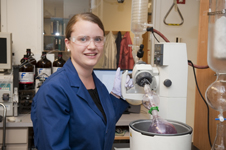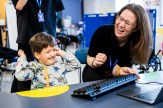A ‘springboard’ to propel her research forward

In June, Emily Corcoran, who is pursing a PhD in chemistry, received career advice from Ei-ichi Negishi, who won the 2010 Nobel Prize in chemistry.
“He told me to use good research as a springboard for my own work,” said Corcoran, whose career goal is to serve as a principal investigator for a lab. “The trick is to apply published research to a new problem so that I can define a field for myself.”
Corcoran was able to absorb Negishi’s words of wisdom first-hand because she was among more than 500 young researchers selected to attend the 61st Meeting of Nobel Laureates at Lindau, Germany — a yearly scientific conference in which Nobel Prize winners in various disciplines exchange ideas with doctoral students from all over the world.
Sharing research and networking with many of the sharpest minds in her field motivated and inspired Corcoran, who called the meeting “really different from any conference I’ve ever attended.”
As she put it, “I’ve never had so many good conversations with super smart, intelligent and driven scientists. It’s great to meet people who will eventually be your colleagues for the rest of your life.”
At Northeastern, Corcoran is designing molecules that could help physicians pinpoint the exact location of cancerous tumors in the human body.
Robert Hanson, Matthews Distinguished Professor of Bioorganic and Medicinal Chemistry, praised her research, which is funded by a four-year, $2.4 million grant from the U.S. Department of Energy.
“She’s doing all of the chemistry on her own,” said Hanson, who serves as Corcoran’s faculty advisor. “It’s one thing to write it all out on paper, but making things work in the lab is an entirely different challenge.”
The conference, he said, has boosted Corcoran’s confidence and shed light on the ways in which her research will impact the biomedical community.
“She can aim as high as she wants to in terms of a career path,” he said. “The next step for her is to consider what she wants to do with her research in order to accomplish her technical and intellectual goals.”





